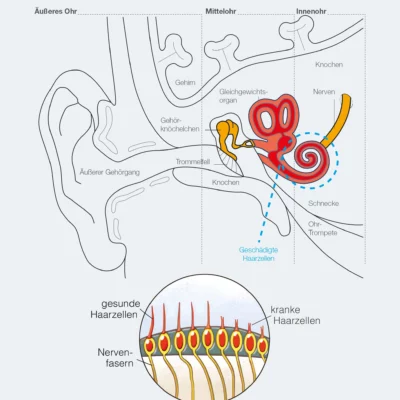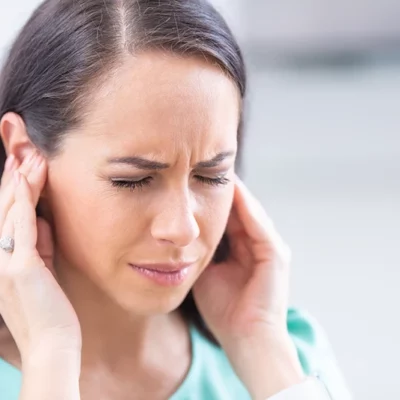TINNITUS AND OTHER INNER EAR DISEASES
Tinnitus, hyperacusis, hearing loss and Meniere’s disease: all these terms describe different hearing impairments that often occur in combination and can be an enormous burden for patients. Tinnitus refers to the perception of sounds such as ringing, hissing or whistling in the ear without the presence of an external sound source. In hyperacusis, there is hypersensitivity to sounds that are perceived as normal in other people. Hearing loss can have various causes and manifest itself in varying degrees of severity. Meniere’s disease is a specific disorder of the inner ear that manifests itself through symptoms such as dizziness, hearing loss and tinnitus. Particularly in the case of tinnitus, other symptoms and diseases (comorbidities) may be added, such as stress, depression or anxiety.
Below you will find comprehensive information on the various clinical pictures and possible treatment methods.

What is tinnitus?
Tinnitus is a symptom that begins with a more or less intense ringing, whistling, hissing, buzzing, beeping or throbbing in one or both ears. In most cases, the tinnitus sounds occur detached from a sound source, which means that other people cannot perceive them. If the tinnitus lasts longer than three months, it is called “chronic tinnitus”. This can affect the entire perception and make the life of the affected person unbearable.
Where does tinnitus originate?
Tinnitus often begins as a disturbance in the inner ear or auditory pathway (“psychoacoustic phenomenon”), in short: a malprocessing of acoustic signals in the brain. These malfunctions are triggered, for example, by damage to auditory sensory cells in the inner ear, which in turn causes ions to flow uncontrollably into these damaged cells and trigger “overexcitation” here. This causes an increased release of so-called messenger substances (neurotransmitters), which constantly creates so-called “potentials” in the auditory pathway, which can be interpreted by the brain as tinnitus.
Chronic tinnitus is caused by a negative learning process of the auditory pathway: After a sufficiently long exposure to the processing brain areas, the ear noise is stored as a pattern and remains there as an independent signal. After that, it doesn’t matter whether the original trigger disappears or not: the sound or noise remains.
Causes and diagnosis
The causes are as varied as its manifestations and effects. In any case, a detailed medical examination of the affected person is necessary, for example by ENT specialists, psychosomatics, neurologists, internists, psychiatrists, psychologists and/or orthopedists. Only they can rule out a physical cause such as Meniere’s disease (a disorder of the inner ear), narrowing of the large vessels of the neck, wear and tear of the cervical spine, temporomandibular joint disorders, as well as a number of internal diseases such as diabetes, lipid metabolism disorders, and hypertension, for example.
Very often, tinnitus is also caused by damage to the inner ear as a result of noise or sound trauma. This can cause irreparable damage to the inner and outer hair cells in the cochlea.
Current research also shows that severe psychological stress, such as stress at school or at work, can also be a trigger for tinnitus.
Treatment methods
We have compiled an overview of current therapy offers, these are based on the S3 guideline Chronic Tinnitus, published in 2021.
Distribution
The number of tinnitus patients is constantly increasing: In Germany alone, there are several million people who suffer from tinnitus. One in four affected persons complains of a loss of quality of life. Therefore, it is extremely important that research into the causes of tinnitus, as well as new treatments, be intensified.
Sources:
1 Deutsche Gesellschaft für Hals-Nasen-Ohren-Heilkunde, Kopf- und Hals-Chirurgie e. V. (ed.), S 3-Leitlinie Chronischer Tinnitus, AWMF-Register-Nr. 017/064, Sept. 2021, p. 6 ff.: https://register.awmf.org/de/leitlinien/detail/017-064
2 Boecking B, von Sass J, Sieveking A, Schaefer C, Brueggemann P, Rose M, Mazurek B., Tinnitus-related distress and pain perceptions in patients with chronic tinnitus – Do psychological factors constitute a link?, Plos One, June 2020, https://doi.org/10.1371%2Fjournal.pone.0234807
3 Hesse, G., Tinnitus, 2nd edition, 2016, Stuttgart: Thieme: https://eref.thieme.de/ebooks/1153629#/ebook_1153629_SL48627866

What is hyperacusis?
Hyperacusis is a disorder of sound processing characterized by an excessive response to sounds that are not normally perceived as unpleasant. In contrast, in phonophobia, another form of hypersensitivity to sound, the fear of specific sounds comes to the fore. Recruitment is the term used when those affected are hard of hearing and perceive sounds as too loud, especially in the damaged hearing range.
Symptoms
People with hyperacusis find everyday sounds such as the sound of the sea, the clattering of dishes in the kitchen, or car noise extremely unpleasant or even painful. Symptoms can be very individual and vary from person to person. Some sufferers are sensitive to only a few specific sounds, while others may be hypersensitive to a wide range of sounds.
Causes
The exact causes of hyperacusis are not yet fully understood. However, it is thought that damage to the inner ear or central auditory nervous system, such as from noise, trauma, viral infections, or certain medications, may play a role.
Diagnosis
The diagnosis of hyperacusis is based on a detailed history, a hearing examination and a hearing test. Another diagnostic method is to measure the discomfort threshold, which is the noise level at which hypersensitivity occurs.
Treatment options
Increasing exposure to disturbing sounds is recommended. In some cases, psychotherapeutic treatment, for example in the form of behavioral therapy, may also be helpful. In this process, patients learn to reduce their fear of certain sounds and to identify a healthy way of processing sounds for themselves. If hyperacusis develops due to ear injury or hearing impairment, a hearing aid that attenuates ambient noise or is specifically designed to meet the needs of the patient may help in the course of the condition.
Distribution
Hyperacusis is a rare condition. In the population, about 1-2% of people suffer from this impairment.
Source:
Goebel, G., Hyperacusis – a neglected complaint complex in tinnitus and hearing loss, in: Tinnitus Forum 3-2013, p. 9ff: https://www.tinnitus-liga.de/media/artikel/TF_3_13_goebel.pdf

What is hearing loss?
Hearing loss can manifest itself in varying degrees of severity and can have different causes. Hearing loss occurs from birth in some people and during life in others. Some people suffer from hearing loss that develops gradually, while for others it occurs suddenly and unexpectedly….
Symptoms
Symptoms of hearing loss vary from person to person. Some people may experience only mild hearing loss, while others may experience severe hearing loss. Common symptoms include the inability to follow conversations, the feeling that others are speaking slurredly, the need to turn up the volume on televisions or radios, and the inability to hear certain sounds such as ringing tones or birdsong.
Causes
Hearing loss can be caused by a variety of factors, including genetic predisposition, noise exposure, certain medications, infections and natural aging. Other factors such as injuries to the eardrum or ear canals, as well as tumors or middle ear infections, can also cause hearing loss.
Diagnosis
Hearing loss can be diagnosed by hearing tests, audiograms and if necessary. imaging procedures, e.g. computed tomography (CT) or magnetic resonance imaging (MRI). An:ENT physician can perform these tests and evaluate the results.
Treatment options
There are several treatment options for hearing loss, depending on the cause and severity. One of the most common options is the use of hearing aids, which help improve hearing and make life easier for sufferers. Sometimes surgery may be necessary. In any case, it is important to seek medical advice to find the best individual treatment options.
Distribution
According to the World Health Organization (WHO), hearing loss affects approximately 466 million people worldwide. This means that about one in 14 people in the world has a hearing loss. In Germany, there are about 16 million people who suffer from hearing loss. Hearing loss can occur at any age, but becomes more common with age.
Sources:
1 World Health Organization (ed.), Deafness and hearing loss, Feb 2023: https://www.who.int/news-room/fact-sheets/detail/deafness-and-hearing-loss
2 Michel, O., The new WHO classification of hearing loss: what has changed in 2021?, ENT 69, Nov. 2021, pp. 927-930: https://doi.org/10.1007/s00106-021-01112-2

What is Meniere’s disease?
Meniere’s disease is a chronic disorder of the inner ear that results from a disturbance in fluid balance. This causes excess pressure and rupture of membranes in the inner ear, leading to rotary vertigo, hearing loss and tinnitus. As a result, the quality of life of those affected is usually very severely impaired.
Symptoms
Typical symptoms of Meniere’s disease include dizziness, tinnitus, hearing loss and a feeling of ear congestion. Affected individuals may suffer from violent attacks of vertigo that can last from several hours to days. The dizziness may be accompanied by nausea and vomiting and often leads to a reduction in quality of life. Another accompanying symptom is tinnitus. In advanced stages of the disease, hearing loss may also occur.
Causes
The exact causes of Meniere’s disease are still unknown. However, it is suspected that changes in the immune system, genetic factors or circulatory disorders in the inner ear may play a role. Overproduction or insufficient reabsorption of inner ear fluid (endolymph) is also discussed as a possible cause.
Diagnosis
Diagnosis of Meniere’s disease is usually made through a combination of history, physical examination and hearing tests. An examination of the vestibular organ may also be performed to diagnose the vertigo and rule out other causes.
Treatment options
There are various therapies available to alleviate symptoms and slow the progression of the disease.
Distribution
Meniere’s disease is rare and occurs in 0.01% of the population, mostly between the ages of 45 and 60. Women are affected more frequently than men.
Sources:
1 Deutsche Gesellschaft für Hals-Nasen-Ohren-Heilkunde, Kopf- und Hals-Chirurgie e. V. (Ed.), S2k-Leitlinie Vestibuläre Funktionsstörungen, AWMF-Register-Nr. 017/078, May 2021: https://www.awmf.org/uploads/tx_szleitlinien/017-078l_S2k_Vestibulaere-Funktionsstoerungen_2021-05.pdf
2 German Neurological Society (ed.), Further Evidence for Intratympanic Therapy in Meniere’s Disease, Feb. 2022, https://dgn.org/artikel/2363

What is meant by comorbidities?
Comorbidities refer to the simultaneous occurrence of different diseases. These may be preexistent, independent of tinnitus, or tinnitus-induced. Patients suffering from tinnitus and/or hearing loss often complain of depression, anxiety, somatization or adjustment disorders, often resulting in the development of further impairments. These may include, for example, insomnia, poor concentration, relationship problems, or communication disorders such as hyperacusis. Affected individuals also often report feeling helpless, outcast, and alone.
At the same time, depression and other mental disorders can also be a risk factor for tinnitus development and can exacerbate tinnitus.
Treatment methods
These and similar psychological and psychosomatic complaints that accompany tinnitus or other diseases of the inner ear should be clarified with appropriate specialists in psychosomatic medicine, psychiatry or neurology or with psychological psychotherapists, so that patients can be specifically treated or referred to specialized centers.
For more information, see “Tinnitus – what helps?“.